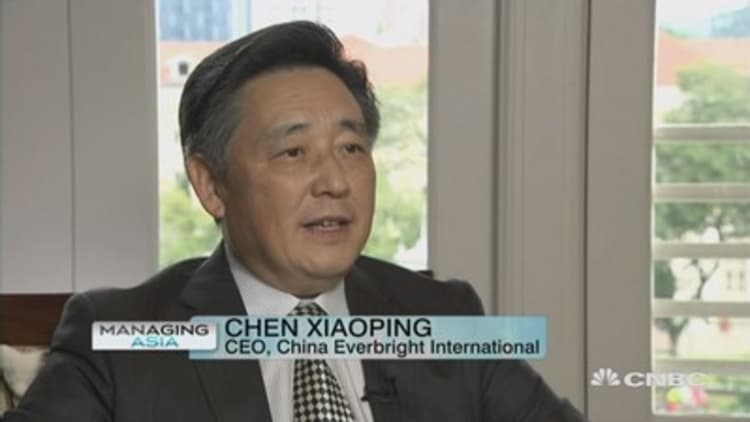

China has a massive garbage problem. Now one former central banker is hoping to find a treasure where others see trash.
The world's second-largest economy currently produces around 250 million tonnes of waste every year. The World Bank projects that this figure will double by 2025 as population surges in metropolitan areas and cities that are disproportionately responsible in generating waste.
Yet for Chen Xiaoping, the CEO of China Everbright International, one of the largest in China's waste management industry, the country's problem with trash means that its market potential is tremendous.
Chen previously held positions at the People's Bank of China and Everbright Bank before moving to Hong Kong to revamp the operations of a subsidiary of the China Everbright Group listed there.
"I studied finance and used to deal with currencies. Now I'm in environmental protection and have to deal with garbage," Chen tells CNBC's Managing Asia, "[But] since I've entered the business, I've fallen in love with it."
When Chen first joined the company, operations at Everbright International had been unsustainable. Chen had considered new opportunities for the company in the real estate, mining or infrastructure sectors but decided against them because of the huge capital outlay.
Eventually, Everbright International ventured into waste management because it required relatively less capital.
"We actually entered the environmental protection industry largely by chance," Chen says.
The gamble appears to have paid off and Everbright International's global footprint has since grown significantly. The company acquired the Polish waste management firm Novago for 123 million euros ($139 million) in June this year. Meanwhile, the company's water business was listed in Singapore in 2014 and it intends to spin-off its green technology business for a Hong Kong listing in the future.
It also helps that the Chinese government has made the environment a top priority in the years ahead. The country's 12th Five-Year Plan pledged 3.4 trillion yuan ($512 billion) to the environmental protection sector. The recently announced allocated an additional 12 trillion yuan worth of investments to the sector.
Today, half of Everbright International's business comes from waste-to-energy, or the burning of solid waste and converting it into energy. This has been supported by subsidies targeted at the waste-to-energy and biomass generation sectors from the government to tackle environmental pollution in the country.
Under Chen's guidance, the company has achieved several milestones in the waste-to-energy sector, including being the first company to adhere to the European Climate Change Programme. Everbright International also increased its transparency standards by working with local state departments and allowing them to monitor the company's emissions.
Within China, Everbright International's strategy consists of expanding its reach beyond the first-tier coastal cities it currently operates it. "We will move from cities to rural areas by shifting our focus from the treatment of solid waste and urban domestic waste to the treatment of waste in rural areas, including agricultural waste and straw," Chen says.
Other growth opportunities Everbright International intends to pursue include a stronger regional presence. The company counts the World Bank and the Asian Development Bank as partners in its bid to encourage environmental protection in developing countries. "We are confident about the regions along the One Belt, One Road route, including Southeast Asia, South Asia, West Asia and Eastern Europe," says Chen.
Ultimately, Chen credits a people-oriented management style and assigning the right people to the right jobs for Everbright International's successful transformation. "Our staff members like working in this industry and have fallen in love with [rubbish]." Chen says.



